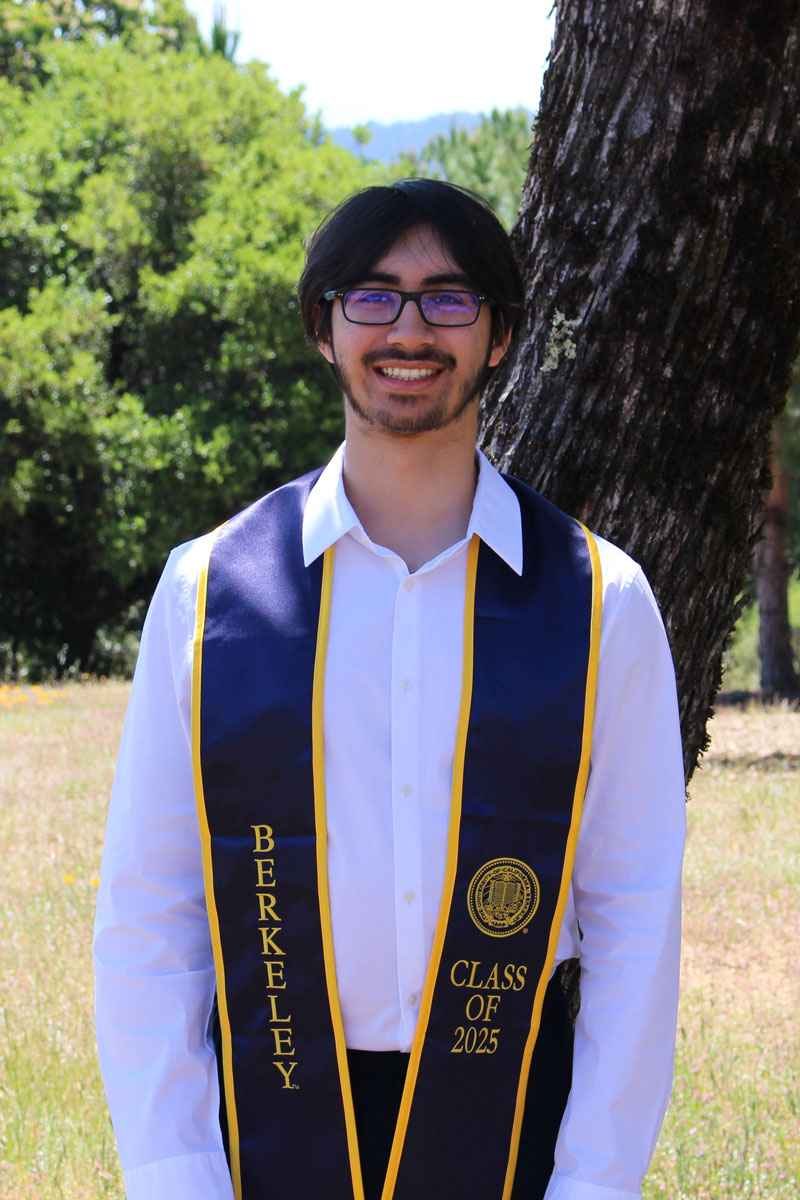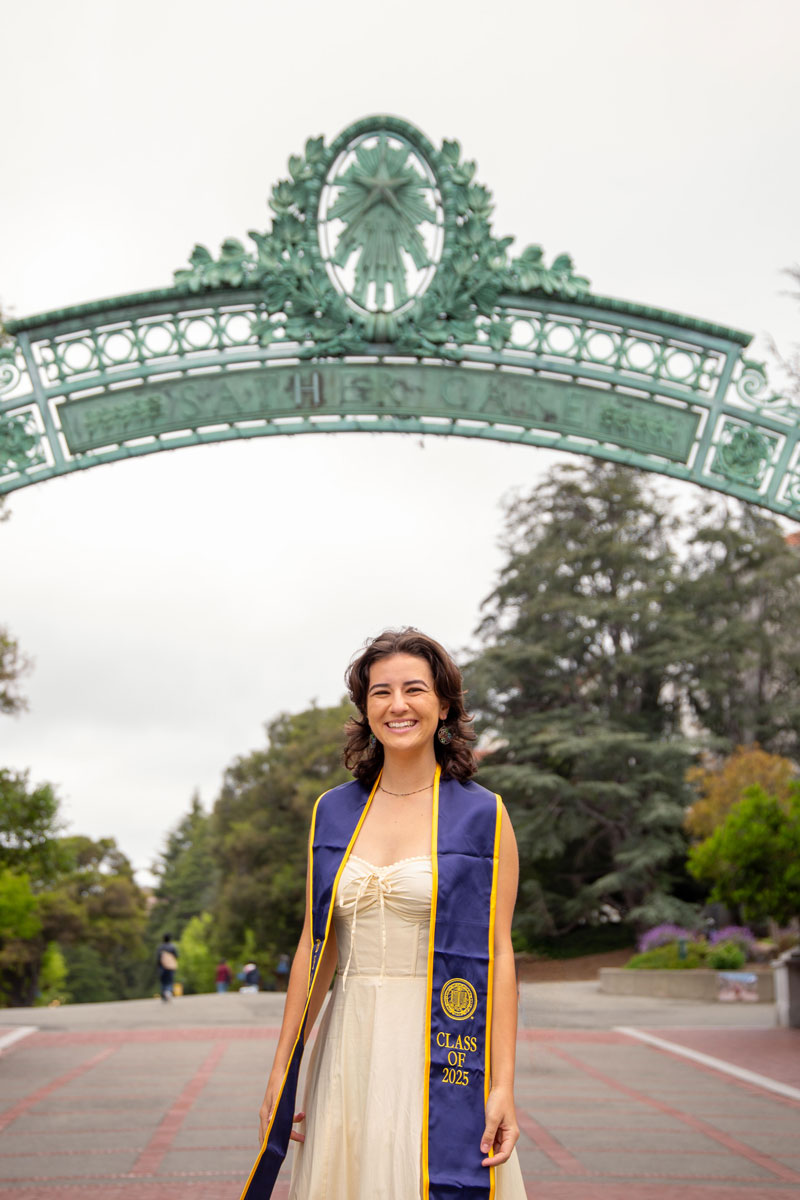Congratulations to Charlie Kortleven, Neel Bajaria, Alexandra Boren, and Nikita Bahadur on receiving the 2025 Kenneth L. Babcock Prize in Environmental Science.
Established in 1995 in memory of Kenneth L. Babcock by a group of donors including his late widow, Claude Babcock, BA ’52 English, MSW ’82, and brother Sherman Babcock, BS ’41 Soil Science, the prize recognizes exceptional academic achievement by graduating seniors in the Department of Environmental Science, Policy, and Management (ESPM).
Charlie Kortleven
Environmental Science and Data Science

Having grown up near the coast, Charlie Kortleven saw firsthand the impact of harmful algal blooms. In her first year at UC Berkeley, Kortleven spearheaded an algal biofuel project as part of the College of Chemistry’s Biofuel Technology Club. Kortleven conducted literature reviews to develop a proposal that ultimately secured funding to build a solar-powered photobioreactor to repurpose waste feedstock for algal biofuel production.
Working with Dr. Elizabeth Dougherty, Kortleven deepened her interest in plant life and diversity, documenting the natural history and restoration ecology of Strawberry Creek. She later joined Dr. Grace Chen’s USDA lab as a biological science aide, where she assisted with transformation experiments to study genes responsible for hydroxy fatty acid accumulation.
As an undergraduate research assistant in the Department of Plant and Microbial Biology (PMB) with Professor Benjamin Blackman, Kortleven investigated the adaptation of monkeyflower. For her honors thesis, she built a bioinformatics pipeline using QTL mapping and variant analysis to identify genomic regions linked to trait variation and transgenerational plasticity in Mimulus laciniatus. She also conducted RNA-seq to study gene expression under temperature stress and extracted DNA from approximately 800 samples to examine Mimulus guttatus in the context of California’s most recent major drought.
Kortleven credits Rausser College’s community of dedicated environmentalists and researchers with reaffirming her goal of pursuing a PhD in marine biology and conservation. This summer, she will begin a research position with the Texas A&M Department of Oceanography, studying how environmental factors influence jellyfish sleep behavior. She is also excited to present her thesis at the Botanical Society of America’s Botany Conference.
Neel Bajaria
Environmental Science

Neel Bajaria has demonstrated remarkable growth and dedication throughout his undergraduate career. He has thrived with support from his peers and academic mentors, allowing him to delve into the diversity of environmental sciences.
As an undergraduate research assistant in ESPM professor Albert Ruhi’s lab, working under graduate student Melissa von Mayrhauser, Bajaria fostered his curiosity and expanded his knowledge of entomology and aquatic invertebrates. Over two-and-a-half years, Bajaria has gained insight into urgent water pollution and management issues and helped new lab members learn the ropes of benthic macroinvertebrate identification. These experiences helped him grow into a prospective freshwater ecologist and inspired him to continue with a senior honors thesis.
For his project, advised by instructor Patina Mendez, PhD '07 ESPM, Bajaria focused on the impact of mercury from the New Almaden Mine near San Jose on aquatic insect communities in the Guadalupe River watershed. He co-led the fieldwork of a six-person crew and analyzed dozens of samples from reference and mine-contaminated sites, identifying several thousand aquatic insects. While developing his project, Bajaria created a web application to improve the accessibility and visualization of benthic macroinvertebrate data collected in California. The app was created using the R programming language and is available for future students to use in their studies.
In addition to his academic and research experience, Bajaria was also involved with Cal Berkeley Democrats, serving as Deputy Editor-in-Chief of the organization’s student magazine. After graduating, he plans to take a gap year to gain work experience before pursuing a graduate degree in a water management and freshwater ecology-adjacent field.
Alexandra Boren
Environmental Science

Alexandra Boren credits the community and support of ESPM for her continued development as a student, leader, and researcher. While at UC Berkeley, Boren embraced the interdisciplinary nature of ESPM by working in three faculty research labs focusing on topics from molecular ecology to conservation psychology.
As an undergraduate research assistant in the lab of Professor Bree Rosenblum, Boren monitored amphibian disease progression in Tilden Regional Park using swabbing and qPCR. She also wrote a first-author publication (currently in review) on reducing animal use in amphibian disease research and presented her findings at the 2023 Amphibian Disease Conference. In the lab of professors George Roderick and Rosemary Gillespie, Boren designed and completed her honors thesis on the ambrosia beetle vectors of Rapid 'Ōhi'a Death—a fungal disease devastating Hawaiian forests—through fieldwork on Hawai'i Island, followed by qPCR and metabarcoding analyses that revealed novel beetle-pathogen interactions. And with guidance from Assistant Professor Alejandra Echeverri, Boren led a Frontiers in Conservation Science study that explored whether learning about one of UC Berkeley’s celebrity falcons motivates the public to support conservation efforts.
In addition to her robust undergraduate research experience, Boren served as president of the Student Association for Environmental Justice and Health Equity, leading students through environmental research and policy projects. She also acted as a teaching assistant for a CURE (Course-Based Undergraduate Research Experience) course taught by Rosenblum.
After graduating, Boren will work with Echeverri to research how environmental documentaries shape public perceptions of conservation. She plans to pursue a PhD in disease ecology and hopes to dedicate her career to environmental conservation.
Nikita Bahadur
Molecular Environmental Biology

Environmental science and sustainability are at the heart of every opportunity Nikita Bahadur pursues. Her commitment to learning and conducting research that contributes to protecting the Earth motivated her to seek several opportunities while at UC Berkeley.
As an undergrad, Bahadur explored how photosynthetic algae could provide sustainable energy and resources in the lab of Plant and Microbial Biology professor Krishna Niyogi and also worked with Energy & Resources Group professor Lara Kueppers on a pan-tropical analysis of carbon allocation to reproduction in regenerating tropical forests. These experiences inspired her to pursue independent research at UC Berkeley’s Gump Station in Mo’orea during a 10-week field course where she studied the factors influencing coconut seed germination.
In early 2024, Bahadur began working with ESPM and Integrative Biology professor Todd Dawson on analyzing how valley oak (Quercus lobata) trees at Blue Oak Ranch Reserve recover from the removal of the hemiparasitic mistletoe Phoradendron villosum. That experience led to an honors thesis advised by Dawson, investigating how leaf cuticle manipulations influence surface water relations in five native California plant species adapted to fog.
Outside of academics, Bahadur has been a dedicated member of the Cal Band for four years and has also participated in the Wind Ensemble, flute choir, an Indian fusion dance team, and a project in the University Herbarium. She is excited to embark on her next journey working in the lab of Plant and Microbial Biology professor Lotus Lofgren, studying ectomycorrhizal fungi.
